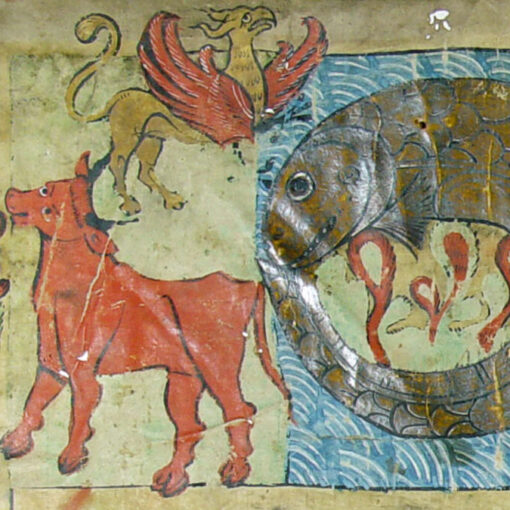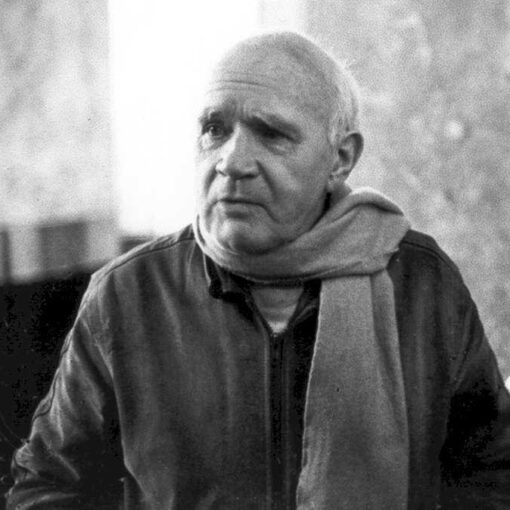By Bernard E. Harcourt
“Totalitarian lawfulness … promises justice on earth because it claims to make mankind itself the embodiment of the law.”
— Hannah Arendt, The Origins of Totalitarianism[1]
Hannah Arendt offered a different theory than Ernst Fraenkel, Franz Neumann, or Friedrich Pollock on the role of law in Nazi Germany. It is important to include her voice as well.
Arendt was deeply influenced by their war-time debates when she penned her landmark contribution, The Origins of Totalitarianism, published in 1951, as well as her addendum to the book, on terror, law, and ideology, published in 1958. As Jens Meierhenrich correctly remarks, in The Remnants of the Rechtsstaat, and as many others have noted, Neumann’s Behemoth in particular shaped Arendt’s argument.[2]
Meierehenrich argues that this worked to the detriment of Arendt’s book because she too embraced Neumann’s misguided view, on his reading, of the non-legal, non-statist interpretation of the Third Reich. “In particular,” he writes, “Neumann’s concept of the non-state, though, as we have seen, of questionable theoretical and empirical value, left a mark on The Origins of Totalitarianism.”[3]
My sense, though, is that Arendt developed a different theory of the role of law in Nazi Germany focusing on Nazi discourse regarding a “higher law” as opposed to merely positive law. This was not the same position nor the same controversy over the relationship between positive law and secular natural law that culminated in the famous debate between H.L.A. Hart and Lon Fuller. Arendt proposed that the Third Reich (and separately, Stalin in the Soviet Union) tried to seize the upper hand in the ubiquitous “rule of law” debates by showing fealty to the only important law that truly mattered, namely some kind of higher law. In this way, both Hitler and Stalin could claim to be the only ones genuinely respecting the rule of law—which, of course, is the touchstone for liberal democracy.
By contrast to Neumann, who characterized the Third Reich as lawless and chaotic, a “non-state” in his words, and to Fraenkel, who identified both a rule bound and lawless dimension to what he called the “Dual State,” Arendt argued that totalitarian forms of government (including both Nazi Germany and Stalinist USSR) disregard positive law but aspire to a higher law. For Nazi Germany, Arendt describes that higher law as “the law of nature,” by which she means the white supremacist belief in the superiority of the Aryan race as a matter of genetic science. In the case of the Soviet Union under Stalin, Arendt described the higher law as “the law of history,” understood as a historical materialist theory that inextricably led to the dictatorship of the proletariat, or in her words the superiority of a class.
By means of this fealty to a higher law, Arendt argues, totalitarian regimes are able to present themselves as perfectly lawful, even more righteously “ruled by law” than liberal democracies. In fact, totalitarian regimes claim the mantel of lawfulness as legitimacy.
Arendt proposes this theory of higher law in Chapter 13 of The Origins of Totalitarianism, a chapter that is entitled “Ideology and Terror: A Novel Form of Government.” Arendt wrote that chapter after the book was published in 1951 and added it to the 1958 edition.
Following the original publication of the book, Arendt had decided to work on the relation between Marx and Engels’ writings and the rise of Stalinism in the USSR, and this led her to the problem of ideology. It resulted in a few articles and ultimately into the chapter that was added to the book in 1958.
In that chapter, “Ideology and Terror,” Arendt explores the nature of totalitarian governments and the principles which inspire citizens to act in totalitarian regimes. She draws on Montesquieu’s analysis of other forms of government, in which Montesquieu argued that honor motivates subjects in a monarchy, virtue in the case of a republic, and fear in a tyranny.[4] Arendt argues that terror serves as the principle of action in a totalitarian regime, but that the terror becomes so pervasive that in its place, a substitute must emerge: ideology.[5] This substitute, Arendt claims, can be understood as (in the case of Nazi Germany) the logic of the idea of racial superiority.[6]
It is in this context that Arendt focuses on the place of lawlessness as the potential essence of totalitarianism.
It would be tempting, Arendt says, to simply qualify totalitarian states as “a lawless government where power is yielded by one man.”[7] But that would be wrong, she argues, a too simplistic understanding of the role of law in Nazi Germany.
It is not the case, Arendt argues, that the Third Reich was a lawless chaos. Rather, the Nazis defied the classic dichotomy between rule bound and lawless regimes, between “arbitrary and legitimate power.”[8] They did so by disregarding the more ordinary and commonplace juridical realm but embracing a higher conception of law: the Nazi dogma of racial superiority, natural selection, and social Darwinism. Arendt writes:
“totalitarian rule confronts us with a totally different kind of government. It defies, it is true, all positive laws, even to the extreme of defying those which it has itself established (as in the case of the Soviet Constitution of 1936, to quote only the most outstanding example) or which it did not care to abolish (as in the case of the Weimar Constitution which the Nazi government never revoked). But it operates neither without guidance of law nor is it arbitrary, for it claims to obey strictly and unequivocally those laws of Nature or of History from which all positive laws always have been supposed to spring.”[9]
The Nazis embrace of higher law operates as a discursive weapon to trump liberal democratic claims to the rule of law. By trivializing the realm of positive law, they flip conventional understanding on its head and claim the mantel of lawfulness. Arendt explains:
“It is the monstrous, yet seemingly unanswerable claim of totalitarian rule that, far from being ‘lawless,’ it goes to the sources of authority from which positive laws received their ultimate legitimation, that far from being arbitrary it is more obedient to these suprahuman forces than any government ever was before, and that far from wielding its power in the interest of one man, it is quite prepared to sacrifice everybody’s vital, immediate interests to the execution of what it assumes to be the law of History or the law of Nature. Its defiance of positive laws claims to be a higher form of legitimacy which, since it is inspired by the sources themselves, can do away with petty legality. Totalitarian lawfulness pretends to have found a way to establish the rule of justice on earth—something which the legality of positive law admittedly could never attain.”[10]
We have seen this played out recently in American politics: political leaders claiming that the enforcement of positive law is purely political and being weaponized, and should give way instead to a popular conception of what is right. The rhetoric has shifted somewhat. The references to race and nature are more veiled than during the Third Reich, even if they are coming closer and closer to the surface. But what is similar is that the ideal of the rule of law, which has conventionally been the exclusive property of liberal democracy, is undergoing ideological drift. It is contested, and no longer the privileged possession of liberals—much like the situation in Germany in the 1930s.
This is what makes Arendt’s analysis in “Terror and Ideology” so prescient and so relevant to the present. It sounds a slightly different tone than the Fraenkel-Neumann-Pollock debates, one that may be worth reintroducing into the conversation at Coöperism 8/13.
Continue here to watch the seminar and read the other essays for Coöperism 8/13 on “The Frankfurt School Critique of National Socialism and State“
Notes
[1] Hannah Arendt, The Origins of Totalitarianism (New York: Meridian Books, Inc., 1958), at p. 462.
[2] Jens Meierhenrich, The Remnants of the Rechtsstaat. An Ethnography of Nazi Law (New York: Oxford, 2018), p. 52.
[3] Meierhenrich, The Remnants of the Rechtsstaat,
[4] Arendt, The Origins of Totalitarianism, p. 467.
[5] Arendt, The Origins of Totalitarianism, p. 468.
[6] Arendt, The Origins of Totalitarianism, p. 469 (“An ideology is quite literally what its name indicate: it is the logic of an idea.”)
[7] Arendt, The Origins of Totalitarianism, p. 461.
[8] Arendt, The Origins of Totalitarianism, p. 461.
[9] Arendt, The Origins of Totalitarianism, p. 461.
[10] Arendt, The Origins of Totalitarianism, p. 461-462.





